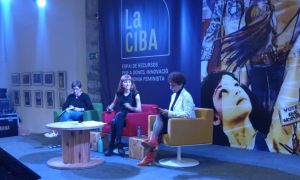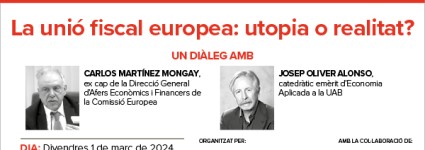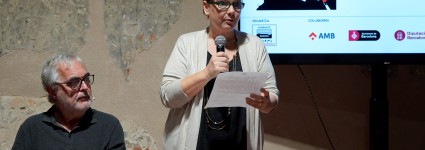The transformation of the city with a gender perspective
On Tuesday, December 13, the last day on metropolitan governance of the cycle "The transformation of the city" was held, where "The transformation of the city with a gender perspective" was addressed. The Catalunya Europa Foundation organized it together with the City of Santa Coloma de Gramenet in the CIBA, a constantly growing municipal space dedicated to resources for women, innovation and feminist economy.
"The transformation of the city" was a cycle of biannual debates (2021-2022) that wanted to reflect on the changes that cities need to push in order to adapt to the multiple crises - climate, health, economic and social - and imagine sustainable solutions for their future. And, in these reflections, it was essential to include the gender perspective and the inequalities that cross us and are derived to our society.
Blanca Valdivia, member of the Col lectiu Punt 6, led a round table focused on three main axes in the configuration of more egalitarian cities: safety in public space, health and the workplace.
Maribel Cárdenas Jiménez, Director of Equality and LGTBI Policies of the City of Santa Coloma, explained the work she is doing with "Santa Coloma, Red Violeta", an initiative born in November 2019 to strengthen the community network and thus preserve safety in public space. The success has been so resounding that after two years has multiplied by four the initial figure of 60 establishments, turning the city into a network of violet spaces, to which people can turn in the face of possible sexist and/or lgbtobic aggression.
Carme Valls Llobet, renowned endocrinologist and director of the "Women, Health and Quality of Life" program of the Center for Health Analysis and Programs, criticized the persisting gender gap in health and the dangerous consequences for men and women of this, due to a lack of gender-sensitive curricula in universities and scientific and clinical research.
For his part, Mentxu Gutiérrez Jiménez, Secretary of Women and Policies LGTBI of CCOO Catalunya introduced the gender pay gap as a concept that best exemplifies inequalities between women and men, taking into account not only salary but also: the sectors and types of work, working conditions, temporary employment, and professional careers of women, as well as the unequal distribution of domestic and care responsibilities. In fact, currently the most feminized jobs are those such as the care and care of people and cleanliness, with great social value but a lower remuneration. Faced with this, Mentxu insisted on the work carried out by unions with companies, introducing through collective bargaining equality plans, policies and protocols that progressively reduce these gaps.
Finally, as an urban sociologist, Blanca Valdivia emphasized that public space is planned and designed in an androcentric and capitalist way, transmitting priorities, roles and hierarchies that perpetuate many gender inequalities. Points out, therefore, that in the framework of an egalitarian society we must move towards a model of a caring city that puts people’s lives at the centre and promotes: greater accessibility, autonomy, proximity, conciliation, co-responsibility, agency, continuity between different spheres and provision of care-related elements.
The event concluded with a subsequent dialogue with each other and with assessments and interventions by the public.
This last act of The transformation of the city has been organized by the Catalunya Europa Foundation with the CIBA, and with the support of the AMB, the Diputación de Barcelona, and the town councils of Barcelona, Santa Coloma de Gramenet and Gavà.












